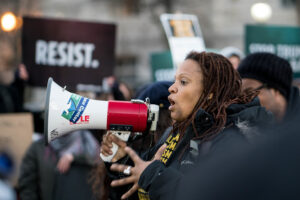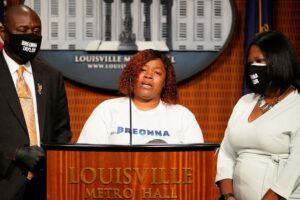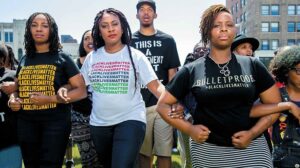James Comey, the director of the Federal Bureau of Investigations, gave a speech before the International Association of Chiefs of Police in late October, telling the group that those filming the police were “driving a wedge between African-American communities and law enforcement.”
It’s an interesting statement since Comey is part of the Obama administration, which has called for body cameras and spoken in favor of the Black Lives Matter movement, saying its focus on police brutality was a “legitimate issue that we’ve got to address.”
“The African-American community is not just making this up,” Obama said during a forum on criminal justice reform hosted by The Marshall Project, a news website led by former New York Times editor Bill Keller. “It is real, and there is a history behind it and we have to take it seriously.”
Many conservatives and law enforcement officials, however, say that the filming of police officers inflames blacks and keeps police from doing their jobs.
But does the filming of police during traffic stops and other arrests really drive a wedge between law enforcement and the African-American community?
To fact-check the claim, TruthBeTold,news turned to recent and historic polling data from Gallup, the Pew Research Center and NBC/Wall Street Journal to gauge the black community’s long-time attitude toward law enforcement.
An August 2014 Gallup poll shows that blacks in the United States have a significantly lower level of confidence in the police as an institution than do whites.
Combined 2011 through 2014 data measuring Americans’ confidence in the police shows that 59 percent of whites have a great deal or quite a lot of confidence in the police, compared with just 37 percent of blacks.
Gallup said that this view of police by African Americans of law enforcement and the racial gap in confidence in the police have been evident in the data throughout the past decade and a half that Gallup has been measuring these trends on an annual basis. That perception has now reached a 22-year low, according to Gallup, echoing sentiment in 1993, a year after the Rodney King riots erupted in downtown Los Angles.
Surveys from Pew and NBC/Wall Street Journal polls found similar results.
An April 2015 Pew poll found that while about 7 in 10 whites expressed a great deal or fair amount of confidence in local police to treat blacks and whites equally, just 36 percent of blacks felt that way.
Those differences were long-standing, the poll found. When similar questions were asked in 2009 and 2007, a similar racial gap was seen, with African-American confidence in police going only as high as 38 percent in 2009.
A September 2014 NBC/Wall Street Journal poll found that 69 percent of white voters expressed confidence that law enforcement officials gave equal treatment to people of both races, while just 28 percent of black voters held that view.
The poll found that blacks were actually slightly more inclined to trust local police officers than they were in 1995 when a similar question was asked, but less likely to agree that law enforcement treats blacks and whites equally.
Criminal justice experts also say that historically there has been a wedge between blacks and law enforcement. The Watts riots in 1965 and the creation of the Black Panther Party a year later were triggered by the black community’s frustrations with police tactics.
“These are issues that we’ve been dealing with for generations,” said former U.S. Attorney General Eric Holder, in a 2014 interview with New York magazine.
In a separate speech at St. Louis Community College last year, Holder further elaborated: “I understand that mistrust. I am the Attorney General of the United States. But I am also a black man. I can remember being stopped on the New Jersey turnpike on two occasions and accused of speeding.
Former New York police officer Joseph Giacalone suggests that issue lies in how law enforcement officers and blacks view one another.
“The perception of crime is something more important,” said Giacalone, a professor at John Jay College of Criminal Justice and a former police officer “It’s very important to understand that however we are taught or whatever perception that we have will be carried along our whole lives.”
He described his time as a police sergeant in the Bronx, New York, as being treated as part of an “occupying force,” with residents often telling him that they didn’t want the police there.
“It always felt like it was this us versus them mentality,” Giacalone said. “As police officers, you were just going to where the crimes were.”
TruthBeTold.news rates Comey’s comment that filming police doing their jobs creates a wedge between the officers and the black community as false. The issue is long-standing and the result of historic mistrust, which has only been reinforced by current events.



